We understand that buying a home, and getting a mortgage is one of the most important purchase decisions you will ever make. That’s why we recommend consulting with one of our loan originators. So, we can help guide you in making the right choice for you. Here are some frequently asked questions, along with their answers to help you begin with your journey into homeownership.
It is not required to have a high credit score to get a mortgage. However, there are advantages to having a good credit score, as it increases the opportunity to select from more loan options and provide a lower down payment. You can still get an FHA mortgage with a low credit score, but this will typically require a higher down payment. Luckily, there are many ways to improve your credit score. These methods include, paying bills on time every month, paying a little more than the minimum on your credit card if possible, avoid using the full credit card amount available, keeping your credit card accounts open and correcting any errors you find on your credit report.

Points are lender costs that are paid to reduce the interest rate on your mortgage loan. Making this decision depends on how much of a rate discount you will receive in exchange for paying points up front.
A good time to refinance is when mortgage rates are much lower than your current interest rate. These opportunities are excellent options to help you lower your rates, which in turn reduce your monthly payments by hundreds of dollars. Refinancing can also provide you with the option to take cash out of your home for large purchases, or to pay off credit card debt.
Mortgage interest rates change on a daily basis. Therefore, it is best not to lock in your rate until your offer has been accepted.
Most lenders will require an appraisal or estimation of the property’s fair market value to validate that the loan is not more than the fair market value of the home.
Like any other insurance, this is a type of mortgage insurance that you might need to pay if you have a conventional mortgage loan and make a down payment of less than 20% of the property’s purchase price. PMI protects the lender in the event that you default on your loan. In a refinance, if you have a conventional loan and your equity is less than 20% of the value of your property, then PMI is typically required.
You can get pre-approved for a home loan before you make an offer by providing a lender with the basic elements needed to calculate how much money you can borrow, based upon your income, credit score, assets and liabilities.
During the application process or mortgage processing, you will be required to provide proof of income and bank or investment statements.
An escrow is a special bank account managed by your lender to pay monthly expenses relating to property taxes and home insurance premiums. If you loan doesn’t include an escrow account, then you will be responsible for paying these large expenses yourself.
Closing costs are fees that are to be paid to the lender to acquire ownership of the home and loan. These fees consist of inspection and appraisal of the home, originating the loan, taxes on the loan, mortgage insurance premium, title search and recording, as well as discount points. Typically, these costs can range from one to three percent of the purchase price of the home.